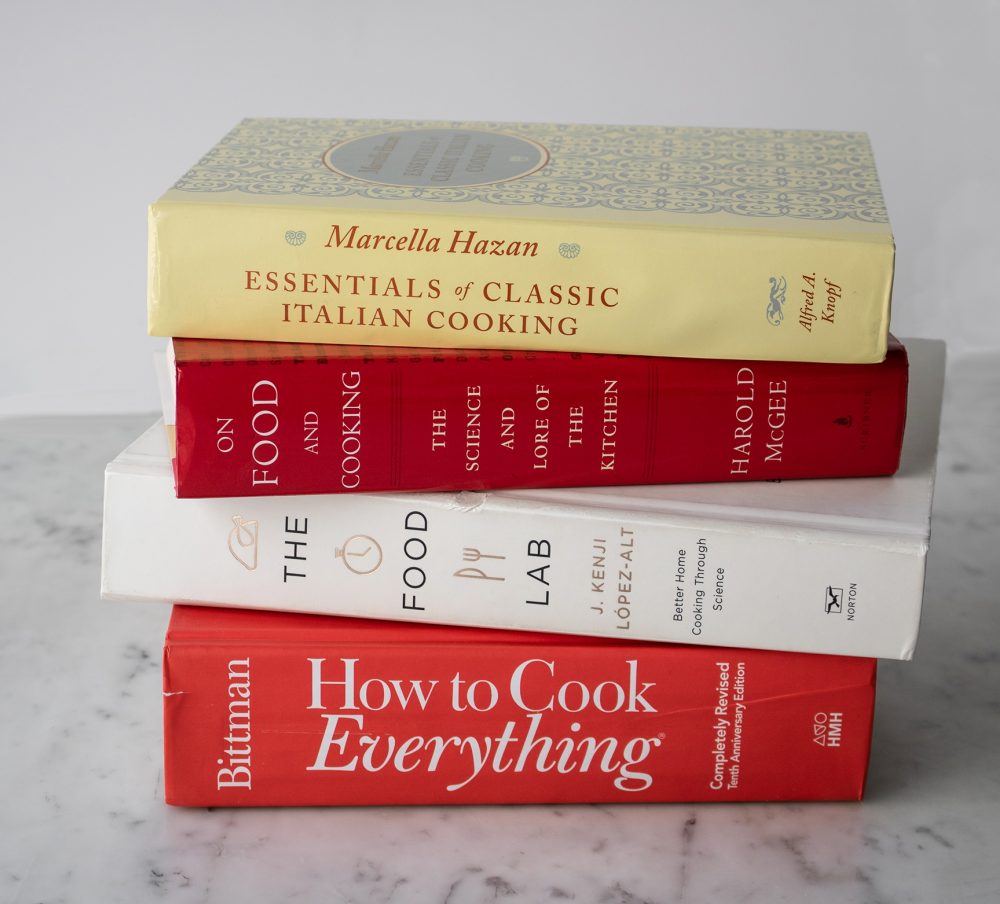There are those cookbooks that highly celebrated restaurant chefs write to show off the inner workings of their kitchens. They come with pristine photos of perfectly plated dishes, and make great coffee table books to flip through or give as gifts. These are not those cookbooks.
These are the cookbooks that get dog eared and grease stained and scribbled in. They’ve taught beginners in the kitchen—the enthusiastic ones as well as the reluctant—how to cook and have left a lasting impression.
That’s why they’re the ones Matt Sartwell of New York City’s Kitchen Arts and Letters recommends as introductory texts when beginners come into his store. When making recommendations to beginners, Sartwell first considers the individual. Are they resigned to finally having to fend for themselves or are they really excited to learn? Are they looking for a foundation on which they can build or for recipes they can follow to a T? He also looks for books with personality that will resonate with and make novices feel connected to more than simple instructions. That’s what will keep them coming back. Finally, he looks for a broad spectrum—a book that will stay useful for a long time.
Time-tested over decades, the classics are a great place to start. While excellent new foundational books certainly exist (Naomi Pomeroy’s 2016 Taste & Technique comes to mind), we see a lot more specialization these days. We’re more likely to expect it. Below, find eight classic cookbooks great for any kind of beginner cook.
“How to Cook Everything”
Mark Bittman
With step-by-step photos and a good variety of recipes, Mark Bittman’s signature tome is one Sartwell recommends to that possibly reluctant cook. It covers fundamentals like the difference between chopped and minced onions, which is contextual information that’s really helpful for people who didn’t grow up around someone who cooks, he says.
“Joy of Cooking”
Irma S. Rombauer
With a new edition coming out this fall—the first update in 15 years—it’s a great time to pick up this one. It lacks photos, which means some people may find it incomprehensible, but Sartwell stands by it. “The great thing about 'Joy' is that it walks you through things like why muffins are mixed differently than angel food cake. It gives you a sense of the process and the technique.”
“Both ‘Joy’ and ‘How to Cook Everything’ are good for someone who feels like owning one cookbook is already a big commitment. They stay useful for a really long time. If I only had one of those books, and I had to make Thanksgiving dinner, I could do it,” Sartwell says.
“The Food Lab: Better Home Cooking Through Science”
J. Kenji López-Alt
When someone comes into Kitchen Arts & Letters with a bit more curiosity, Sartwell may recommend J. Kenji López-Alt’s 2015 “The Food Lab.” “It’s a straight up in the middle, all-American cookbook in terms of taste,” he says, “but it’s incredibly meticulous.” If you’re not interested in a detailed explanation of why you should salt your meat, this book might not be right for you. But for anyone looking to get into the weeds and eventually go off-book, “The Food Lab” is something of a bible.
“On Food and Cooking: The Science and Lore of the Kitchen”
Harold McGee
One step further in that direction is not a cookbook at all, but Kitchen Arts & Letters best-seller, by a long shot: Harold McGee’s seminal work on food science. As Sartwell puts it, “There are people for whom all that explanation about protein structures is too much. There are others for whom it opens up the entire the world.”
“The Zuni Café Cookbook”
Judy Rodgers
For something that doesn’t necessarily present itself as a general foundational text but that goes the distance, Sartwell suggests Judy Rodgers’ book featuring recipes from the iconic San Francisco restaurant. “The recipes are painstaking and informative. Roast chicken takes three pages, but it produces an amazing roast chicken that doesn’t demand a lot from the cook when it comes down to it, which is encouraging,” he says. “Though her roots are in classic French technique, she’s not so bound to it that she feels she has to beat you over the head by it. It has long-range utility, but also has a nice personality.”
“Essentials of Classic Italian Cooking”
Marcella Hazan
The power of personality in a introductory-level cookbook is also why he likes Marcella Hazan’s text combining two earlier works, “The Classic Italian Cook Book” and “More Classic Italian Cooking.” “She’s pretty bossy,” Sartwell says, “but she refined the book, revising the recipes to be more explicit when necessary or more simple when it made sense to do so.” You’ll leave this book and its recipes feeling smarter.
“Classic Indian Cooking”
Julie Sahni
Sartwell recommends this book to beginners looking to cook any type of cuisine because of the way she introduces Indian cooking and the way she concentrates on some fundamental techniques. “She’s putting a solid floor under a cook.” Not all cuisines rely on the same treatment of spices, for example, but Sahni presents a set of basics that are applicable across a wide range of cooking styles.
“When French Women Cook”
Madeleine Kamman
This book, featuring regional French cooking, is “sort of memoir-y,” which Sartwell likes because the reader can learn alongside the author. “As you read, you can grow as a cook alongside her,” he says. For more, check out 15 of the season's best new cookbooks, according to the experts at some of our favorite indie bookstores.
Let us know what cookbooks and bookstores you love on social media: Facebook, Twitter, Instagram and Pinterest




